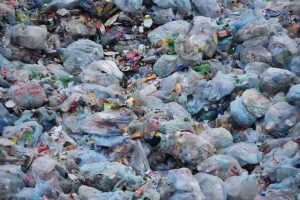Emilia Hyland
Plastic is a part of our everyday lives. An important topic is the use of disposable plastic bags and the effects their journey through our earth systems have on ecosystems. Plastic bags have not always been a part of our consumer culture. It was not until the 1970s that they were introduced in the United States and then in Western Europe in the 80s (Clapp & Swanson, 2009). Although they have only been a part of our culture for a couple of decades, their use has had a lasting impact on the environment already. To supply the demand of the 100 billion plastic bags used in the United States, 12 million barrels of oil are required (Clapp & Swanson, 2009). Oil is a fossil fuel that is nonrenewable and the emissions from its utilization attribute to numerous environmental issues, like climate change. Even their disposal has negative consequences because it is difficult since they are petroleum-based and therefore will not decompose for thousands of years in landfills, thus allowing for harmful chemicals to leach out into the surrounding environment. Recycling plastic bags is not a viable option either since the thin, petroleum plastic is not valuable enough to recycle. (Clapp & Swanson, 2009).

In many countries, plastic bags are given at no additional cost to the customers as they are purchasing their goods. Since they are quick and convenient, no one thinks twice about using them during their busy day to get from one point to another. At the end of their use, they are likely to be sent to the landfill or may be carried by the wind to another location because of their lightweight design. Plastics bags degrade at different rates depending on their composition and the location where they are dumped. They photodegrade, breaking down into smaller bits of plastic, which poses a threat to the animals that may consume the smaller pieces (Clapp & Swanson, 2009). There is no proper way of disposing of the plastic bags, so the only option is to reduce our consumption.

Solutions can range from individual action to the implementation of government policy. On the individual scale, one can bring their own reusable bags shopping. On a larger scale, policy reform can lead to positive social and environmental side effects, like taxing plastic bags to reduce consumption as it has been done in other countries. For instance, in Ireland a 15 Euro cent tax was imposed on plastic bags, which reduced the amount consumed and disposed by 90% (Convery, McDonnell, & Ferreira, 2007). A change in mindset may be required to make such a transition in America, but it is possible. Change will only happen with citizen participation in policy issues, so an individual can make a big difference by talking to their local representatives. Our plastic, consumer culture is the leading cause to harmful plastics in our environment, but by reducing our use of plastic bags through individual action and changes in policy, we might be able to reverse the harm we have already imposed and curtail future degradation.
References:
Clapp. J. & Swanston. L. (2009). Doing away with plastic shopping bags: international patterns of norm emergence and policy implementation. Environmental Politics, 18(3), 315-332.
Convery, F., McDonnell, S., & Ferreira, S. (2007). The most popular tax in Europe? Lesson from the Irish plastic bag levy. Environmental and Resource Economics, 38(1), 1-11.